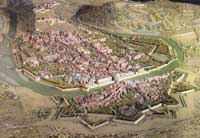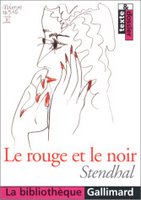Housecleaning
Any ideas? Would you read along?
Previously read: The Red and the Black, War and Peace, Middlemarch.
(Ah, my dear sir: a novel is a mirror, talking a walk down a big road. Sometimes you'll see nothing but blue skies; sometimes you'll see the muck in the mud piles along the road. And you'll accuse the man carrying the mirror in his basket of being immoral! His mirror reflects muck, so you'll accuse the mirror, too! Why not also accuse the highway where the muck is piled, or, more strongly still, the street inspector who leaves water wallowing in the roads, so the mud piles can come into being.)Later (in Ch. 22), he inserts another during the secret political meeting where Julien is the note-taker:
(The author would have preferred, at this point, to insert a page consisting of nothing but ellipses. "That would look awful," said the publisher, "and, for such a lightweight book, looking bad is, quite simply, death." -- "Politics," the author replied, "is a stone tied around literature's neck, and in less than six months, it sinks under the weight. Politics set among the imagination's concerns is like a pistol shot fired at a concert. The noise mangles without energizing. It does not harmonize with the sound of any instrument in the orchestra. Politics will mortally offend half your readers, and bore the other half, who would have found the discussion fascinating, and wonderfully lively, in the morning newspaper...." -- "If your characters don't talk politics," responded the publisher, "they'll cease to be the Frenchmen of 1830, and your book will no longer be a mirror as you claim it is....")I love this. What do you think about Stenhal's argument here? His resistance to politicizing his narrative is certainly still an issue today.
He discovered a small cave in the almost perpendicular face of one of the rocks. He set his course for it, and presently was ensconced in this retreat. 'Here,' he said, his eyes sparkling with joy, 'men can do me no harm.' It occurred to him to indulge in the pleasure of writing down his thoughts, so dangerous to him in any other place. A smooth block of stone served as his table. His pen flew: he saw nothing of the scene round about him. At length he noticed that the sun was setting behind the distant mountains of Beaujolais.I haven't read much philosophy, but it seems that Julien fits the type of the Romantic-hero wannabe. Is Stendhal slyly criticizing this ideal, or is he demonstrating (through Julien) how the ideal can never by reached by someone of such shallow character?
'Why should I not spend the night here?' he asked himself; 'I have bread, and I am free!' At the sound of that great word his heart leaped, his hypocrisy meant that he was not free even with Fouque. His head supported on both his hands, Julien stayed in this cave happier than he had ever been in his life, engrossed in his dreams and in the joy of freedom. Without heeding it he saw fade and die, one after another, the last rays of evening light.

...what I object to in the Cours de la Fidelite is the barbarous manner in which the authorities keep those sturdy plane trees trimmed and clipped short. Instead of looking, with their low, rounded, flattened heads, like the commonest of vegetables, they would like nothing better than to take on the magnificent form they develop in England. But the mayor's will is despotic, and twice a year the branches of all trees belonging to the commune are mercilessly amputated. ...This specific kind of tree-trimming is called pollarding. It isn't seen much in North America, but is pretty common in European cities. It's an ancient practice, a way of making a tree that would otherwise be very large into a manageable street-tree. As you can see from the picture, the tree forms big bulging nodes on the end of its branches (my Dad used to call these "cat-heads", but I'm not finding a confirmation of that term on the web). These nodes don't get any higher, year after year, because a tree only grows bigger around, not taller, except at the very ends of its branches. Slender shoots spring up from the nodes, and when they start getting too big, they are trimmed back.
"I like shade," replied Monsieur de Renal... "I have my trees trimmed to make them give more shade, and I can't imagine what else a tree is made for if, unlike the useful walnut tree, it doesn't bring in money."
This horror of feeding with the servants was not natural to Julien; he would, in seeking his fortune, have done other things far more disagreeable. He derived this repugnance from Rousseau's _Confessions_. It was the one book that helped his imagination to form any idea of the world.It goes on:
The collection of reports of the Grand Army and the _Memorial de Sainte-Helene_ completed his Koran. He would have gone to the stake for those three books. Never did he believe in any other. Remembering a saying of the old Surgeon-Major, he regarded all the other books in the world as liars, written by rogues in order to obtain advancement.Ok, I'm definitely in for the long-haul--this is going to be fun. (The epigraph by "ENNIUS" made me smile as well.)
With his fiery nature Julien had one of those astonishing memories so often found in foolish people.

A novel is a mirror that strolls along a highway. Now it reflects the blue of the skies, now the mud puddles underfoot. [The Red and the Black, ch 49]
The Red and the Black, Stendhal’s masterpiece, is the story of Julien Sorel, a young dreamer from the provinces, fueled by Napoleonic ideals, whose desire to make his fortune sets in motion events both mesmerizing and tragic. Sorel’s quest to find himself, and the doomed love he encounters along the way, are delineated with an unprecedented psychological depth and realism. At the same time, Stendhal weaves together the social life and fraught political intrigues of post–Napoleonic France, bringing that world to unforgettable, full-color life. His portrait of Julien and early-nineteenth-century France remains an unsurpassed creation, one that brilliantly anticipates modern literature.
 Published in 1830, the novel's events span the years 1827-1829. Both Middlemarch and War and Peace are historical novels, written many decades after the events they describe. I'm curious how Stendhal then will present "history" — I expect a sense of immediacy, without the benefit of hindsight nor the filters of historians.
Published in 1830, the novel's events span the years 1827-1829. Both Middlemarch and War and Peace are historical novels, written many decades after the events they describe. I'm curious how Stendhal then will present "history" — I expect a sense of immediacy, without the benefit of hindsight nor the filters of historians.Politics in a literary work, is like a gun shot in the middle of a concert, something vulgar, and however, something which is impossible to ignore. [The Charterhouse of Parma, ch 23]
The Russians imitate French ways, but always at a distance of fifty years. [The Red and the Black, ch 54]
In our calling, we have to choose; we must make our fortune either in this world or in the next, there is no middle way. [The Red and the Black, ch 8]
A novel is like a bow, and the violin that produces the sound is the reader's soul.